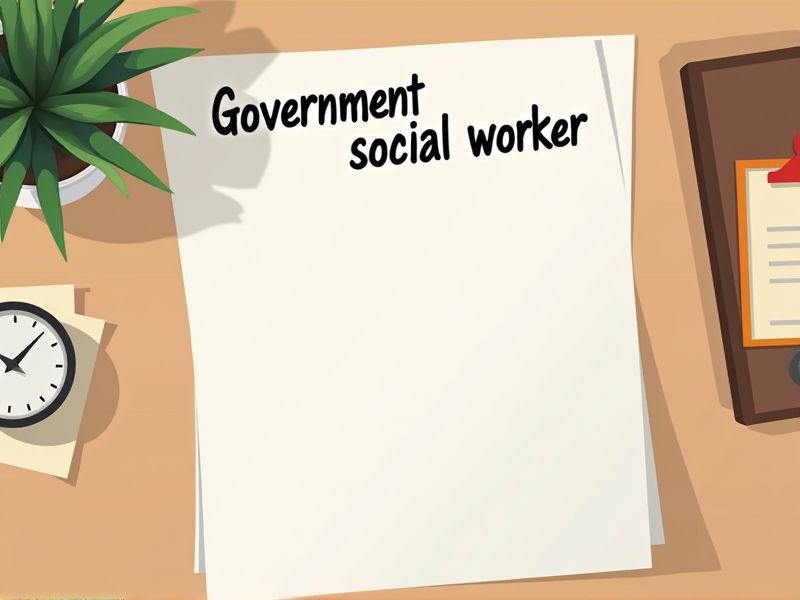
Government social workers often face complex situations and vulnerable populations, necessitating specialized knowledge and skills. Certifications ensure a standardized level of competencies and ethical practice, aligning with legal requirements. Certified social workers demonstrate a commitment to continuous professional development, fostering trust among clients and stakeholders. Here are some important certifications relevant to government social workers.
Licensed Clinical Social Worker (LCSW)
An LCSW provides essential mental health support, aiding government social work by addressing clients' psychological needs alongside social issues. Their clinical training ensures accurate assessment and intervention, which enhances the effectiveness of government programs. LCSWs can diagnose mental health conditions, offering vital insight into complex individual and family dynamics. This expertise contributes to more comprehensive and holistic government social welfare strategies.
Licensed Master Social Worker (LMSW)
The role of a Licensed Master Social Worker (LMSW) in government is crucial due to their advanced training in social policies and programs, equipping them to effectively implement and evaluate public assistance initiatives. Their expertise in crisis intervention and assessment enables them to address complex social issues such as poverty, abuse, and mental health, which are prevalent in communities served by government agencies. LMSWs possess the necessary skills to engage and advocate for vulnerable populations, ensuring their needs are represented and met within government systems. Collaboration with other government professionals is enhanced through the LMSW's understanding of regulatory frameworks and ethical standards, promoting coherent, multidisciplinary approaches to social welfare.
Certified Social Worker (CSW)
The presence of a Certified Social Worker (CSW) in government roles often leads to more effective program implementation because they possess specialized knowledge in assessing community needs. Their training ensures adherence to ethical standards and legal regulations, which minimizes potential legal liabilities for government agencies. Data suggests that CSWs can facilitate more efficient resource allocation, as they are adept at identifying the most impactful interventions. Their skills in crisis management and support can lead to improved individual and community outcomes, reducing long-term social and economic costs.
Certified Social Work Case Manager (C-SWCM)
The role of a Certified Social Work Case Manager (C-SWCM) is crucial for government social workers because it ensures a standardized level of competence and skill. Professional certification enhances the ability to navigate complex bureaucracies and effectively connect clients with appropriate resources. Evidence suggests that certified case managers improve client outcomes by facilitating more efficient service delivery. The credential promotes greater accountability and trust among stakeholders, fostering collaboration between government agencies and community organizations.
Certified Child Welfare Specialist (CCWS)
Certified Child Welfare Specialists (CCWS) bring specialized expertise, which enhances the effectiveness of government social work interventions. Their training helps identify and address intricate child welfare issues, leading to improved child safety and well-being. They elevate the standard of care and accountability within child welfare services. Increased trust from the community and better outcomes for children and families are often the result.
Crisis Intervention Certification
Crisis Intervention Certification equips government social workers with essential skills for effectively managing emergency situations, reducing the risk of escalation. Trained social workers can provide immediate and appropriate responses during crises, which minimizes potential harm to individuals and communities. Certification ensures adherence to standardized practices, enhancing the credibility and accountability of social workers. Enhanced skills and knowledge from certification lead to better outcomes and more efficient crisis resolution in diverse and challenging environments.
Trauma Informed Care Certification
Social workers dealing with government cases often encounter clients with trauma backgrounds, necessitating a trauma-informed approach to ensure effective communication and support. Trauma Informed Care Certification equips social workers with strategies to recognize and address trauma symptoms, reducing the likelihood of re-traumatization during intervention. Certification fosters skills in creating a safe environment, enhancing clients' trust and engagement in the social services process. A trauma-informed framework can lead to improved client outcomes and efficient resource utilization, benefiting both the individuals served and the broader community.
Mental Health First Aid Certification
Government social workers frequently engage with individuals experiencing various mental health challenges. Mental Health First Aid Certification equips them with essential skills to recognize and respond to signs of mental health crises effectively. This training leads to more timely interventions and appropriate referrals to specialized care, reducing the risk of escalation. Social workers with this certification can provide better support and resources, enhancing the overall well-being and safety of the communities they serve.
Substance Abuse Counseling Certification
Substance Abuse Counseling Certification equips government social workers with specialized knowledge to effectively support individuals struggling with addiction. Certified professionals are often more adept at developing and implementing evidence-based treatment plans, enhancing the success rate of recovery programs. Certification is often a prerequisite for accessing federal funding, ensuring that government agencies remain eligible for crucial financial support. A certified social worker can significantly contribute to public health objectives, reducing the societal and economic impact of substance abuse.
Emergency Management Certification
Emergency Management Certification equips government social workers with essential skills to efficiently respond to crises and disasters. This training enhances the ability to coordinate resources and manage emergency situations, reducing potential harm to vulnerable populations. With the certification, social workers can improve collaboration with other agencies, ensuring cohesive and effective disaster response efforts. The specialized knowledge gained helps in developing comprehensive emergency plans that prioritize community resilience and recovery.
Summary
By acquiring certifications, you gain a deeper understanding of policies and best practices, which enhances your decision-making abilities. This expertise often leads to increased trust and credibility among communities, resulting in more effective communication and engagement. Certified social workers typically experience improved job satisfaction and career advancement opportunities, as they can provide higher-quality services. The government, in turn, benefits from having a more competent workforce, which can lead to better social outcomes and resource allocation.
